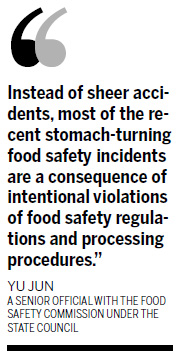Society
Bad intentions threaten food safety
By Zhou Wenting (China Daily)
Updated: 2011-06-14 07:52
 |
Large Medium Small |
BEIJING - Intentional contamination by food producers and processors driven by profits are largely being blamed for the food safety crisis in China, officials with the country's top food security watchdog said on Monday.
|
 |
"Instead of sheer accidents, most of the recent stomach-turning food safety incidents are a consequence of intentional violations of food safety regulations and processing procedures," said Yu Jun, a senior official with the Food Safety Commission under the State Council, China's Cabinet, at the Third China Food Safety Forum.
The 2008 melamine-tainted baby formula scandal spurred the Chinese government to declare food safety a national priority. Nationwide outrage exploded over melamine-contaminated baby milk that sickened 300,000 infants and killed six children.
In April, steamed buns containing illegal dyes were found in Shanghai and Wenzhou in Zhejiang province. Authorities closed a Shanghai-based bun company and later shut down an unlicensed workshop making steamed buns after the buns were allegedly found to contain prohibited chemicals.
More recently, the disease control authority in Hangzhou, capital of Zhejiang province, said it found that products of a local company contain plasticizer used to soften plastic.
"In addition to physical, chemical and biological pollution that caused food safety incidents, the contamination of violators' integrity is more salient," said Wang Hong, deputy director of the department of food production supervision under the General Administration of Quality Supervision, Inspection and Quarantine.
"In the past, food safety issues in China were caused by sanitation problems, such as microbiological and environmental pollution. Now the situation has changed. The lust for profits stimulates some food producers to break the law," Yu said.
Food safety experts said a well-rounded legal framework and a reliable and powerful law enforcement agency is badly needed.
"Shady food producers will only adventure into the game of risk and return when they know the chance of being investigated and treated is very small," said Peter Ben Embarek, food safety and nutrition technology officer of the World Health Organization's China Office.
To address the existing problems, the Chinese government will continue to carry out a variety of supervision and investigation campaigns on food safety, officials said.



